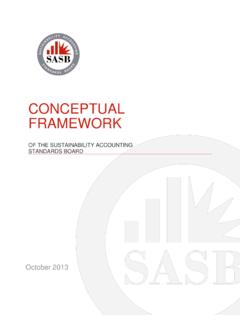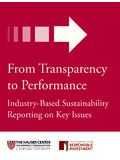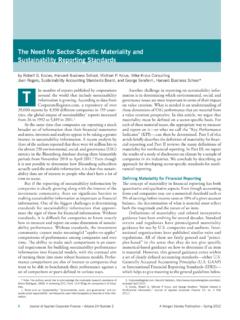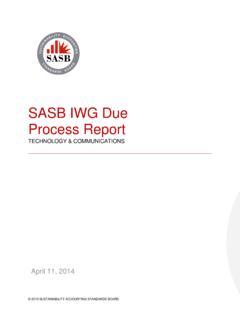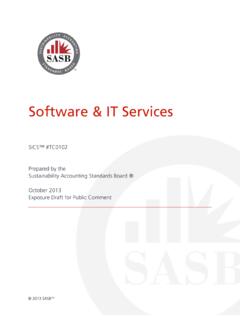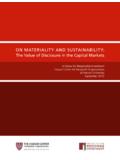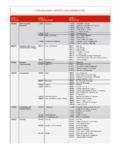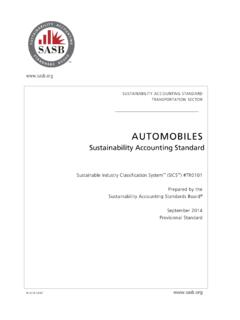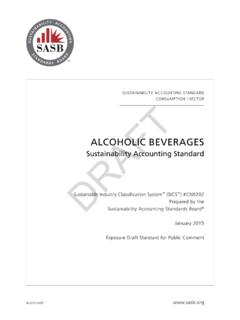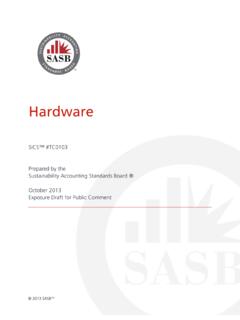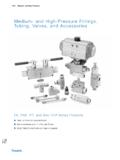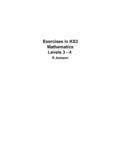Transcription of PULP & PAPER PRODUCTS
1 SUSTAINABILITY ACCOUNTING STANDARD RENEWABLE RESOURCES & ALTERNATIVE ENERGY SECTOR 2015 SASB Sustainable Industry Classification System (SICS ) #RR0202 Prepared by the Sustainability Accounting Standards Board December 2015 Provisional Standard pulp & PAPER PRODUCTSS ustainability Accounting Standard 2015 SASB SUSTAINABILITY ACCOUNTING STANDARD | pulp & PAPER PRODUCTSSUSTAINABILITY ACCOUNTING STANDARDS BOARD1045 Sansome Street, Suite 450 San Francisco, CA 94111 & PAPER PRODUCTSS ustainability Accounting Standard The information, text, and graphics in this publication (the Content ) is owned by Sustainability Accounting Standards Board. All rights reserved. You may use the Content only for non-commercial, informational, or scholarly use, provided that you keep intact all copyright and other proprietary notices related to the Content, and that you make no modifications to the Content. The Content may not be otherwise disseminated, distributed, republished, reproduced, or modified without the prior written permission of Sustainability Accounting Standards Board.
2 To request permission, please contact us at About SASBThe Sustainability Accounting Standards Board (SASB) provides sustainability accounting standards for use by publicly-listed corporations in the in disclosing material sustainability information for the benefit of investors and the public. SASB standards are designed for disclosure in mandatory filings to the Securities and Exchange Commission (SEC), such as the Form 10-K and 20-F. SASB is an independent 501(c)3 non-profit organization. Through 2016, SASB is developing standards for 79 industries in 10 ACCOUNTING STANDARD | pulp & PAPER PRODUCTST able of ContentsIntroduction ..1 Purpose & Structure ..1 Industry Description ..1 Guidance for Disclosure of Sustainability Topics in SEC filings ..2 Guidance on Accounting of Sustainability Topics ..4 Users of the SASB Standards ..5 Scope of Disclosure ..5 Reporting Format ..5 Timing ..7 Limitations ..7 Forward Looking Statements ..7 Sustainability Disclosure Topics & Accounting Metrics.
3 9 Greenhouse Gas Emissions ..10 Air Quality ..13 Energy Management ..15 Water Management ..18 Fiber Sourcing & Recovery ..22 SUSTAINABILITY ACCOUNTING STANDARD | pulp & PAPER PRODUCTS | 1 SASB 2015 TM INTRODUCTION Purpose & Structure This document contains the SASB Sustainability Accounting Standard (SASB Standard) for the pulp & PAPER PRODUCTS industry. SASB Sustainability Accounting Standards are comprised of (1) disclosure guidance and (2) accounting standards on sustainability topics for use by and foreign public companies in their annual filings (Form 10-K or 20-F) with the Securities and Exchange Commission (SEC). To the extent relevant, SASB Standards may also be applicable to other periodic mandatory filings with the SEC, such as the Form 10-Q, Form S-1, and Form 8-K. SASB Standards identify sustainability topics at an industry level, which may constitute material information depending on a company s specific operating context for a company within that industry.
4 SASB Standards are intended to provide guidance to company management, which is ultimately responsible for determining which information is material and should therefore be included in its Form 10-K or 20-F and other periodic SEC filings. SASB Standards provide companies with standardized sustainability metrics designed to communicate performance on industry level sustainability topics. When making disclosure on sustainability topics, companies can use SASB Standards to help ensure that disclosure is standardized and therefore decision-useful, relevant, comparable, and complete. SASB Standards are intended to constitute suitable criteria as defined by AT .321 and referenced in AT 7012, as having the following attributes: Objectivity Criteria should be free from bias. Measurability Criteria should permit reasonably consistent measurements, qualitative or quantitative, of subject matter. Completeness Criteria should be sufficiently complete so that those relevant factors that would alter a conclusion about subject matter are not omitted.
5 Relevance Criteria should be relevant to the subject matter. Industry Description The pulp & PAPER PRODUCTS industry consists of companies that manufacture a range of wood pulp and PAPER PRODUCTS , including pulp fiber, PAPER packaging and sanitary PAPER , office PAPER , newsprint, and PAPER for industrial applications. Companies in the industry typically function as business-to-business entities and may have international operations, including in Canada and Brazil. While some integrated companies own or manage timber 1 #at_101_fn7 2 SUSTAINABILITY ACCOUNTING STANDARD | pulp & PAPER PRODUCTS | 2 SASB 2015 TM tracts and are engaged in forest management or logging, sustainability issues arising from these activities are addressed in SASB s Forestry & Logging (RR0201) industry standards. Guidance for Disclosure of Sustainability Topics in SEC Filings 1. Industry-Level Sustainability Topics For the pulp & PAPER PRODUCTS industry, SASB has identified the following sustainability disclosure topics: Greenhouse Gas Emissions Air Quality Energy Management Water Management Fiber Sourcing & Recovery 2.
6 Company-Level Determination and Disclosure of Material Sustainability Topics Sustainability disclosures are governed by the same laws and regulations that govern disclosures by securities issuers generally. According to the Supreme Court, a fact is material if, in the event such fact is omitted from a particular disclosure, there is a substantial likelihood that the disclosure of the omitted fact would have been viewed by the reasonable investor as having significantly altered the total mix of the information made available. 3,4 SASB has attempted to identify those sustainability topics that are reasonably likely to have a material effect on the financial condition or operating performance of companies within each SICS industry. SASB recognizes, however, that each company is ultimately responsible for determining what information should be disclosed within the context of Regulation S-K and other guidance. Regulation S-K, which sets forth certain disclosure requirements associated with Form 10-K and other SEC filings, requires companies, among other things, to describe in the Management s Discussion and Analysis of Financial Condition and Results of Operations (MD&A) section of Form 10-K any known trends or uncertainties that have had or that the registrant reasonably expects will have a material favorable or unfavorable impact on net sales or revenues or income from continuing operations.
7 If the registrant knows of events that will cause a material change in the relationship between costs and revenues (such as known future increases in costs of labor or materials or price increases or inventory adjustments), the change in the relationship shall be disclosed. Furthermore, Instructions to Item 303 state that the MD&A shall focus specifically on material events and uncertainties known to management that would cause reported financial information not to be necessarily indicative of future operating results or of future financial condition. 2 3 TSC Industries v. Northway, Inc., 426 438 (1976). 4 (Item 303)(a)(3)(ii). SUSTAINABILITY ACCOUNTING STANDARD | pulp & PAPER PRODUCTS | 3 SASB 2015 TM The SEC has provided guidance for companies to use in determining whether a trend or uncertainty should be disclosed. The two-part assessment prescribed by the SEC, based on probability and magnitude, can be applied to the topics included within this standard: First, a company is not required to make disclosure about a known trend or uncertainty if its management determines that such trend or uncertainty is not reasonably likely to occur.
8 Second, if a company s management cannot make a reasonable determination of the likelihood of an event or uncertainty, then disclosure is required unless management determines that a material effect on the registrant s financial condition or results of operation is not reasonably likely to occur. 3. Sustainability Accounting Standard Disclosures in Form 10-K a. Management s Discussion and Analysis For purposes of comparability and usability, companies should consider making disclosure on sustainability topics in the MD&A, in a sub-section titled Sustainability Accounting Standards Disclosures. 5 b. Other Relevant Sections of Form 10-K In addition to the MD&A section, it may be relevant for companies to disclose sustainability information in other sections of Form 10-K, including, but not limited to: Description of business Item 101 of Regulation S-K requires a company to provide a description of its business and its subsidiaries. Item 101(c)(1)(xii) expressly requires disclosure regarding certain costs of complying with environmental laws: Appropriate disclosure also shall be made as to the material effects that compliance with Federal, State and local provisions which have been enacted or adopted regulating the discharge of materials into the environment, or otherwise relating to the protection of the environment, may have upon the capital expenditures, earnings and competitive position of the registrant and its subsidiaries.
9 Legal proceedings Item 103 of Regulation S-K requires companies to describe briefly any material pending or contemplated legal proceedings. Instructions to Item 103 provide specific disclosure r equirements for administrative or judicial proceedings arising from laws and regulations that target discharge of materials into the environment or that are primarily for the purpose of protecting the environment. Risk factors Item 503(c) of Regulation S-K requires filing companies to provide a discussion of the most significant factors that make an investment in the registrant speculative or risky, clearly stating the risk and specifying how a particular risk affects the particular filing company. 5 SEC [Release Nos. 33-8056; 34-45321; FR-61] Commission Statement about Management s Discussion and Analysis of Financial Condition and Results of Operations: We also want to remind registrants that disclosure must be both useful and understandable.
10 That is, management should provide the most relevant information and provide it using language and formats that investors can be expected to understand. Registrants should be aware also that investors will often find information relating to a particular matter more meaningful if it is disclosed in a single location, rather than presented in a fragmented manner throughout the filing. SUSTAINABILITY ACCOUNTING STANDARD | pulp & PAPER PRODUCTS | 4 SASB 2015 TM c. Rule 12b-20 Securities Act Rule 408 and Exchange Act Rule 12b-20 require a registrant to disclose, in addition to the information expressly required by law or regulation, such further material information, if any, as may be necessary to make the required statements, in light of the circumstances under which they are made, not misleading. More detailed guidance on disclosure of material sustainability topics can be found in the SASB Conceptual Framework, available for download via Guidance on Accounting for Sustainability Topics For each sustainability topic included in the pulp & PAPER PRODUCTS i ndustry Sustainability Accounting Standard, SASB identifies accounting metrics.
